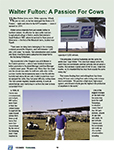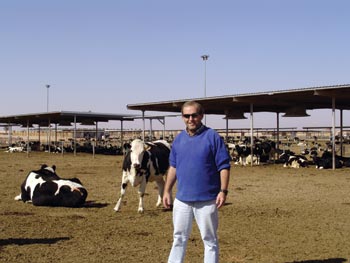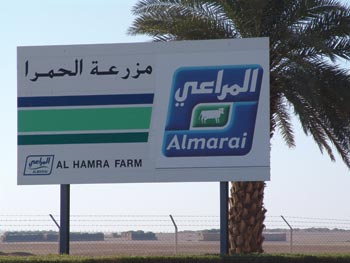Walter Fulton: A Passion For Cows |
 |
<<Click to see original |
Walter Fulton loves cows. With a passion. Which is just as well, as he has managed the farm at Al Hamra — right next door to the CPP complex — since it opened in 1994.

Walter comes originally from just outside Belfast in Northern Ireland. His affection for dairy cattle took him to agricultural college in Antrim, and he first started in Saudi Arabia in 1982, where he worked for three years at Athamama — the first of the Masstock farms, located near Riyadh.
“There were ten dairy farms belonging to the company, scattered around the Kingdom, each with between 1,000 and 2,000 cows,” he recalls. “But rationalisation soon started and these small farms were subsumed into larger farms – the first being Al Nakheel.
“My second stint in the Kingdom was at Al Median in the Eastern province — where I was livestock foreman, before promotion to Assistant Manager and then Manager — lasted seven years. We were only 10kms from the coast and the climate was awful for staff and cattle alike. In the summer months the temperatures were in the 40s with the humidity well above 80 per cent. It didn’t matter how much we sprayed the cattle; they had great difficulty cooling down. The milk coolers regularly stopped working, to such an extent that we even had to buy in ice from the town to keep our product fresh.”
In 1994, Al Hamra was commissioned, and in April, 880 heifers were flown in from the United States to augment the cows moved across from three small farms that were then closed down. By the end of the following year, it had reached its capacity of 5,000 animals.

“The principles of animal husbandry are the same the world over,” says Walter. “The cow must always come first, and if they are comfortable and fed correctly and are given a routine, they produce a good yield of milk for you. Cows love routine, so it’s important that we treat them exactly the same every day.”
That means feeding them and milking them four times every 24 hours and cooling them with misting units to keep them comfortable. “We practise a high-input, high-output system, and Almarai’s herds give the highest milk production of anywhere in the world.”
One of the biggest changes on the farm over the years has been the staff. Nowadays, localisation means that of the 154 farm workers, around 30 per cent are Saudi, 45 per cent are Filipinos and the remainder are made up of a number of nationalities including Kenyan, Sri Lankan, Irish, British and Thai.
Reporting to Walter is a team of three assistant managers who look after the individual units that make up the staff, including teams for milk, breeding, health, feeding, young stock and maintenance. “We have a monthly meeting, but of course we see each other all the time, so any important issues are dealt with straight away,” he says.
“We make up our budget and we stick to it. There are regular visits from the regional manager and support staff and we also have a nutritionist who flies in from the US monthly, but apart from that we are left to our own devices.”
The nutritionist analyses the feed, inspects the cows, checks the condition of the milk and so on, and then makes recommendations on the feed for all the animals from one week old calves right up to the milking herd. “It’s important to have someone in from outside,” says Walter, “as they come in with fresh eyes and might see things that we have missed because we’re too close to the problem. Besides, they also bring in new ideas and keep us up to date with new techniques and research.”
Back in the 80s, the farm managers used to make regular field trips to Arizona to learn new techniques. “We would consider that if we picked up just one good idea, it was well worth the trip.” But on a visit that Walter made in 1997 to the same American farms, it was clear that things had changed.
“Almarai has invested heavily in its farms, whereas the Americans have not. The result is that new ideas are now going back in the opposite direction. You even see advertisements in farming magazines that refer to Saudi-style buildings.”
Walter talks with pride about the tremendous job satisfaction he gets from working in Almarai, and especially in Al Hamra. “Nowhere else in the world could I get as much backup and technical support,” he says. “They give you a job to do, they let you get on with that job without interference, but they’re always there if ever you should need them.”
Walter admits that he has little time for relaxation. He is up at six every morning for the first milking and ends each day at around 11pm with a drive round the farm. His family live in Riyadh and he sees them every weekend, taking it in turns to stay on the farm or Riyadh. But he hates city life and, he says, his wife — who comes from the Philippines — has started to appreciate country living too.
But he has a number of ambitions for when he retires. He loves to travel, and would very much like to travel the world. He would also like to manage a farm in America, “taking it from just average to the very top of the chain”. And he would like to end his days in the Philippines.
But there’s one philosophy that takes him through life. “I find if you treat people the way you would like to be treated yourself, you can’t go far wrong. What hurts me will probably hurt them too.
“I’m a born optimist and I thrive on achieving things, especially in adversity.”
And with that, Walter smiles and heads back once again to his beloved cows.
